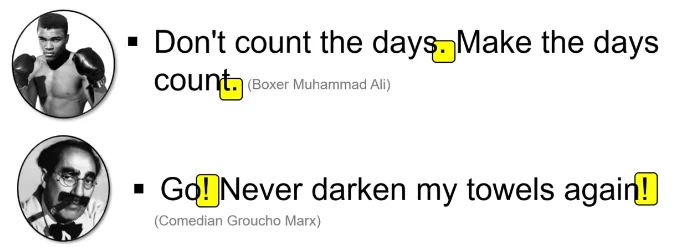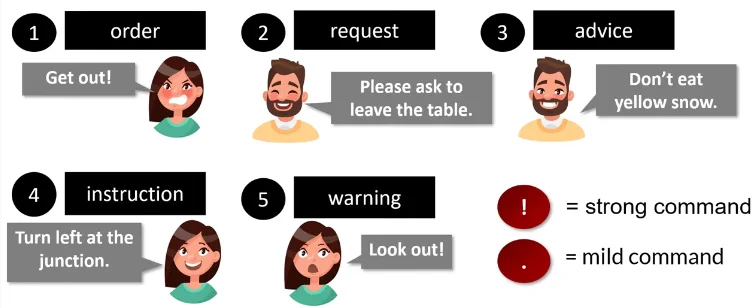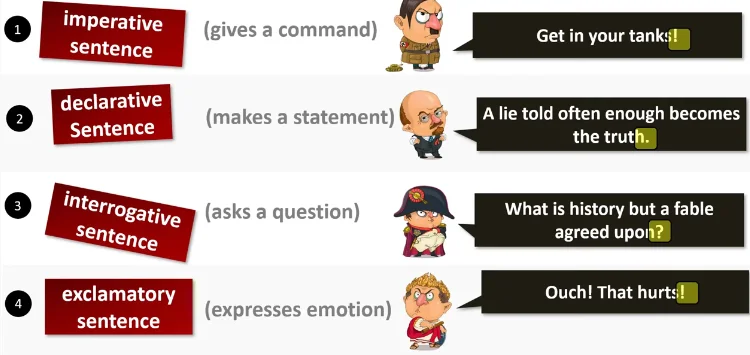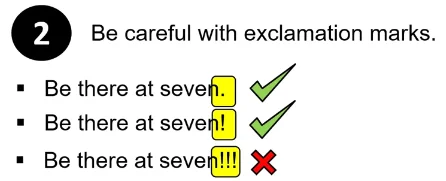Definition for Imperative Sentence
Imperative sentences are the kind of sentences that give a direct command, ask for a request, offer a piece of advice put instruction, or give a warning. For example:
- Tidy your room.
- Be quiet!
- Polish my Shoes.
- Shut your mouth for a while!
- Come to my office at 9 O’clock.
Let’s put up some real examples:

Notice the top one ends with a full stop and the bottom one ends with exclamation marks. Look at the top one, “Don’t count the days… this is a direct command telling you not to do something. So, an imperative sentence gives a direct command but the command can come in lots of forms, for example, it can be:
Functions of Imperative Sentences

| No. | Functions | Examples |
| 1. | Order or Command | Go outside the room! |
| 2. | Request | Please ask him to leave the table. |
| 3. | Advice | Don’t eat yellow snow. |
| 4. | Instruction | Turn left at the junction or as a warning. |
| 5. | Warning ⚠ | Be aware of the danger! |
Examples of Command Sentences
- Bring a bucket full of milk.
- Write a letter immediately to your manager!
- Take your breakfast in time.
- Don’t hit the electric bell!
- Don’t touch the wire.
- Do not skip the class today.
- Don’t repent over the gone days.
Notice that some sentences end with a full stop or a period and others end with an exclamation mark. These are the two ways you can end an imperative sentence.
Examples of Request Sentences
- Please! Ask to leave the table.
- Give me a pen, please!
- Kindly remove these dots.
- Please! Forgive the children.
- Join us timely, please!
Examples of Advice Sentences
- Avoid eating yellow leaves.
- It’s better to stay tonight with us.
- Take the dose of medicine twice a day.
- Take care of your health and wealth.
- Don’t keep the company of bad guys.
Examples of Instruction Sentences
- Turn left at the junction or as a warning.
- Write in between the lines.
- Follow the rules to be a good citizen.
- Go straight to the home.
- Try to control your emotions publically.
Examples of Warning Sentences
- Look out!
- Save yourself first.
- Be aware of your enemy.
- Pay extra attention to the pets.
- Climb up the tree after seeing the lion.
Four kinds of Sentence

- Imperative Sentence (Gives a Command)
- Declarative Sentence (Makes a Statement)
- Interrogative Sentence (Asks a Question)
- Exclamatory Sentence (Expresses Emotion)
Now, look at the four sentences how they end.
- A full stop or an exclamation mark for an imperative sentence.
- A full stop for a declarative sentence.
- A question mark for an interrogative sentence.
- An exclamation mark for an exclamatory sentence.
A sentence that ends with an exclamation mark gives a strong command and a full stop gives a mild command.
Two common errors with Imperative Sentences

Be careful with exclamation marks
For a mild command, you can use a full stop. But, for a more forceful command, you can use an exclamation mark. But be more careful with exclamation marks than full stops because the amount of intended force is not always clear to the reader. For example:
You might have meant that as you must be there at seven but it could have been taken as to be there at seven because you are always late and that could offend someone. So, just be careful with exclamation marks it’s not always obvious how much force is intended.
No use of more than one Exclamation Marks

you should never use more than one exclamation mark unless it’s a text to your friend or a very informal email. Just stick to one exclamation mark. If you find yourself having to use more than one then you should probably adjust your style of writing.
Recap of Imperative Sentences
An imperative sentence is a kind of sentence that gives a direct command, instruction, advice, or request. And, it can end with a full stop or a period. But, for a more forceful command, it can end in an exclamation mark. The verb and imperative sentence will be the bare infinitive that is the version you see in the dictionary. But, to form the negative version just put= “Do not” or = “Don’t” in front of the Imperative Sentence.
